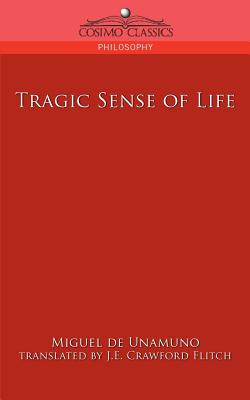Tragic Sense of Life

Tragic Sense of Life
To the mentality that assumes, more or less consciously, that we must of necessity find a solution to every problem, belongs the argument based on the disastrous consequences of a thing. Take any book of apologetics-that is to say, of theological advocacy-and you will see how many times you will meet with this phrase-"the disastrous consequences of this doctrine." Now the disastrous consequences of a doctrine prove at most that the doctrine is disastrous, but not that it is false, for there is no proof that the true is necessarily that which suits us best. -from "The Rationalist Dissolution" This is the masterpiece of Miguel de Unamuno, a member of the group of Spanish intellectuals and philosophers known as the "Generation of '98," and a writer whose work dramatically influenced a wide range of 20th-century literature. His down-to-earth demeanor and no-nonsense outlook makes this 1921 book a favorite of intellectuals to this day, a practical, sensible discussion of the war between faith and reason that consumed the twentieth century and continues to rage in the twenty-first century. de Unamuno's philosophy is not the stuff of a rarefied realm but an integral part of fleshly, sensual life, metaphysics that speaks to daily living and the real world. Spanish philosopher MIGUEL DE UNAMUNO (1864-1936) was a prolific writer of essays, novels, poetry, and the stage plays. His books include Peace in War (1895), The Life of Don Quixote and Sancho (1905), and Abel S nchez (1917).
PRP: 54.95 Lei
Acesta este Prețul Recomandat de Producător. Prețul de vânzare al produsului este afișat mai jos.
49.45Lei
49.45Lei
54.95 LeiIndisponibil
Descrierea produsului
To the mentality that assumes, more or less consciously, that we must of necessity find a solution to every problem, belongs the argument based on the disastrous consequences of a thing. Take any book of apologetics-that is to say, of theological advocacy-and you will see how many times you will meet with this phrase-"the disastrous consequences of this doctrine." Now the disastrous consequences of a doctrine prove at most that the doctrine is disastrous, but not that it is false, for there is no proof that the true is necessarily that which suits us best. -from "The Rationalist Dissolution" This is the masterpiece of Miguel de Unamuno, a member of the group of Spanish intellectuals and philosophers known as the "Generation of '98," and a writer whose work dramatically influenced a wide range of 20th-century literature. His down-to-earth demeanor and no-nonsense outlook makes this 1921 book a favorite of intellectuals to this day, a practical, sensible discussion of the war between faith and reason that consumed the twentieth century and continues to rage in the twenty-first century. de Unamuno's philosophy is not the stuff of a rarefied realm but an integral part of fleshly, sensual life, metaphysics that speaks to daily living and the real world. Spanish philosopher MIGUEL DE UNAMUNO (1864-1936) was a prolific writer of essays, novels, poetry, and the stage plays. His books include Peace in War (1895), The Life of Don Quixote and Sancho (1905), and Abel S nchez (1917).
Detaliile produsului











